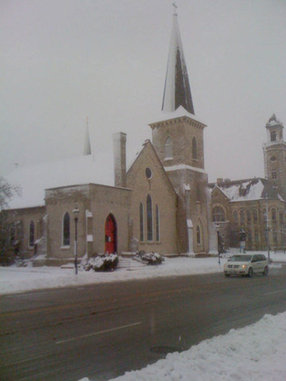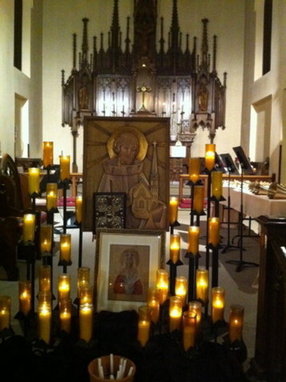St. Matthias Episcopal Church
About Us
Are you a seeker? A thinker? A doubter? Are you looking for a community that serves God, honors the mystery our our relationship to the divine in worship, and challenges you to think critically? One that respects diversity and discourse while uniting in our devotion to God? One that serves those in need? We strive to fulfill this calling, but acknowledge we can only do so with God's help.
St. Matthias was founded in 1844 by the missionary James Lloyd Breck, who is commemorated as a saint by the Episcopal Church. The church building was finished in 1853 and consecrated in 1855. The Lady Chapel was added in 1887.
We find our unity in the worship of God through the richness of ritual in the Episcopal tradition, whose roots pass through the Church of England into the early ages of the church. We serve those in need whom Christ has commended to us through our co-location with the Hebron House of Hospitality, Project Change Recovery School, and multiple twelve-step groups. We celebrate Christian unity in diversity though our partnership with Waukesha City Church, and we educate our people for lives of faith and hope through our Christian education and Education For Ministry programs.
We are people of prayer, lifting the needs of the world to God, and asking God to transform us for service.
We are catholic and protestant, reformed and reforming, faithful and searching, contemplative and active.
Wherever you are on your journey - a seeker, a doubter, or a disciple, you will be welcomed at St. Matthias.
- Vibe
- Casual, Traditional Liturgy, Old-school, Progressive, Inclusive, Historic, Young families, Neighborhood-focused
- Programs
- Community Service, Social Justice, Addiction/Recovery, Youth Group, Choir, Adult Education, Children's Ministry
- Denomination
- Episcopal
- Networks
- Size
- Small
- Language
- English
- Founded
- 1844
Our Services
- Sunday
-
- 08:00am
- Elizabethan Language Holy Eucharist
- 10:00am
- Modern Language Holy Eucharist with Music
- Saturday
-
- 05:00pm
- Modern Language Evening Prayer & Eucharist with Music












